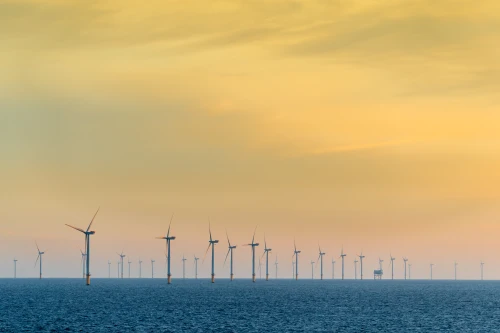
May 8th, 2025
Join our Italian Energy Day on 20 May – Book now
Market volatility plays a crucial role in shaping the dynamics of Power Purchase Agreements (PPAs), particularly in the renewable energy sector. PPAs offer a solution to stabilising energy costs, but their fixed pricing models can become challenging in a fluctuating market.

We explore the impact of market volatility on PPAs, addressing key factors such as weather, infrastructure failure, and financial risks, as well as strategies like hedging mechanisms and the role of long-term agreements.
A power purchase agreement (PPA) is a contractual agreement between a renewable energy producer and an energy procurer, it allows renewable energy to be bought and sold at a fixed rate.
These contracts tend to be financed by a lender - usually a bank, credit provider or finance provider - who assesses the risk of the contract and awards finance where relevant.
The energy market can be a volatile marketplace to operate in, with lots of factors impacting the pricing, demand, supply and production, which can have a knock-on effect on the terms of the PPA, the buyer, the seller and the lender. Due to this volatility, a PPA often fixes the price of energy for a length of time. We take a look at one of the most influential and untameable factors affecting the power market.
The weather affects the majority of renewable PPAs because the weather affects the majority of renewable power sources. Key renewable sources such as wind and solar use the weather to generate electricity, so if there is a lack of wind or sun, the price of energy can go up, making the fixed-price PPA inefficient for the energy seller.
As well as having a positive impact on renewable power, the weather can also have a catastrophic effect on renewable energy production. This is because much of the renewable energy technology used to generate electricity is exposed to these weather elements. This causes the technology to break down over time, for example, transmission line failures. When an array is out of action, it affects the pricing of energy as supply is lowered, driving prices up and making PPAs unprofitable for renewable power producers during these downtime periods. Generally, supply and demand are one of the biggest factors that affect pricing for renewables and can make a PPA a good option or a bad one.
Geopolitics can have a huge impact on market factors and, in turn, on whether a renewable PPA is beneficial or not to the seller or buyer. This is because some countries are large producers of energy, and when they are politically volatile, they can manipulate supply and demand in the marketplace.
Energy price increases : Spikes in energy have been seen in recent years, which have made fixing energy prices attractive for energy procurers, however this might be considered unbalanced if renewable energy providers are not benefiting from these price spikes.
Pricing volatility When volatility in the market effects price structures, other market conditions can mean that the pre-agreed prices in the PPA fall short.
Regulatory and policy risks As the market evolves, regulations and policy are changing with them. It’s important that both energy sellers and buyers keep informed of impending changes that affect PPA contracts.
Hedging is a method businesses use to protect themselves against the fluctuations that are present in the energy market. Hedging includes forward strategising, such as buying energy at a fixed price so that it doesn’t increase as part of a PPA agreement, options and swaps.
PPAs will often be fixed price for a certain number of years, for example, 10 years, as it makes the contract more attractive to a renewable energy procurer as they can fix their energy costs and have more freedom to set budgets, forward schedules and long-term financial plans. This can be mutually beneficial to both parties that make up the PPA - an energy buyer gets set costs for a certain length of time, while renewable energy providers confirm long-term financing for their renewable projects.
Growing demand for more adaptable contract structures means that the types of PPAs available for draft include not only fixed price options but also more flexible agreements to allow for increases and decreases in energy pricing. They fall broadly into the following categories:
Fixed - Offer fixed cost savings over a set number of years.
Bundled - A supply service manages delivery of energy as well as supply. Renewable supply can be combined with fossil fuels as part of the contract.
Hybrid - Hybrid offers the ability to combine different pricing structures of different prices of energy as part of one PPA, with some at fixed price and some at varied.
Floating and Market Following - Different energy sources can also be combined as well as both fixed and varied priced energy sources.
Power Purchase Agreements remain a vital tool in stabilising energy costs amidst market volatility, but they are not without their challenges. As the energy sector evolves, flexible and innovative PPA structures will be key to addressing fluctuations in energy supply, pricing, and market conditions. With the right risk management strategies, both buyers and sellers can benefit from PPAs despite the uncertainties of the market.
Our end to end support helps you learn the market, find contract partners and sign PPAs